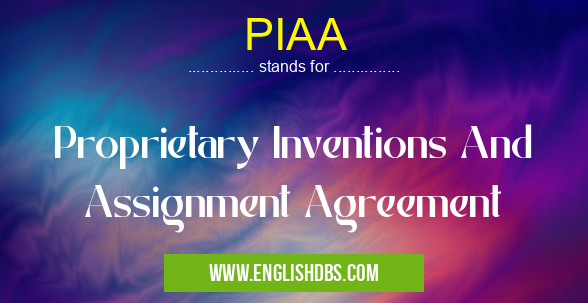What does PIAA mean in UNCLASSIFIED
A Proprietary Inventions And Assignment Agreement (PIAA) is a legal document that defines the ownership and rights to intellectual property created by employees during their employment. It outlines the terms and conditions under which the employee assigns their intellectual property rights to the employer.

PIAA meaning in Unclassified in Miscellaneous
PIAA mostly used in an acronym Unclassified in Category Miscellaneous that means Proprietary Inventions And Assignment Agreement
Shorthand: PIAA,
Full Form: Proprietary Inventions And Assignment Agreement
For more information of "Proprietary Inventions And Assignment Agreement", see the section below.
Significance of PIAAs
- PIAAs are important for protecting the intellectual property rights of both employers and employees/contractors.
- They ensure that inventions and creations developed during employment or engagement belong to the correct party.
- They prevent unauthorized use or exploitation of intellectual property.
- They facilitate collaboration and encourage innovation by providing clear guidelines for ownership and sharing of ideas.
Key Provisions of PIAAs
- Ownership: The PIAA typically assigns ownership of inventions and creations to the employer or client.
- Disclosure and Assignment: Employees or contractors are obligated to disclose all inventions and creations to their employer or client within a specified time frame.
- Confidentiality: PIAAs often include confidentiality and non-disclosure provisions to protect sensitive information related to intellectual property.
- Term and Termination: The PIAA may specify the duration of its validity and the terms for its termination.
Essential Questions and Answers on Proprietary Inventions And Assignment Agreement in "MISCELLANEOUS»UNFILED"
What is a Proprietary Inventions And Assignment Agreement (PIAA)?
What are the key provisions typically included in a PIAA?
Key provisions of a PIAA typically include:
- Definitions of relevant terms, such as "invention" and "intellectual property"
- Employee's obligation to disclose and assign inventions to the employer
- Employer's ownership rights to assigned inventions
- Employee's acknowledgment of employer's rights and agreement to cooperate in obtaining patents and other protections
- Confidentiality and non-disclosure obligations of the employee
- Exceptions and limitations to the employee's assignment obligations
What types of inventions are typically covered by a PIAA?
PIAAs typically cover inventions that are created during the course of the employee's employment, regardless of whether they are created on company time or using company resources. This can include inventions related to products, processes, designs, software, and other intellectual property.
Who is responsible for filing and obtaining patents for inventions assigned under a PIAA?
The employer is typically responsible for filing and obtaining patents for inventions assigned under a PIAA. However, the employee may be required to assist in the process, such as by providing technical information or signing patent applications.
What are the benefits of having a PIAA in place?
PIAAs provide several benefits for employers, including:
- Protection of the employer's intellectual property rights
- Clear definition of ownership and rights to inventions
- Facilitation of patent filing and prosecution
- Reduction of the risk of intellectual property disputes with employees
Final Words:
- PIAAs are essential legal instruments for protecting and managing intellectual property rights in various industries.
- They provide clarity and certainty regarding ownership, rights, and obligations, fostering innovation and protecting the interests of both employers and employees/contractors.
